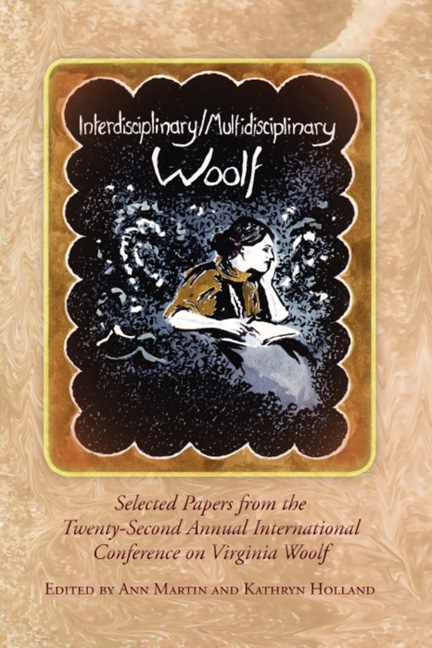Book contents
- Frontmatter
- Contents
- Introduction to Interdisciplinary/Multidisciplinary Woolf
- Acknowledgments
- List of Abbreviations
- History, Materiality, Multiplicity
- Patterns, Practices, Principles
- “Waving to Virginia”
- Woolf, Defoe, Derrida: Interdisciplinary dogs—or the canine aesthetics and (gender) politics of creativity
- “The law is on the side of the normal”: Virginia Woolf as Crip Theorist
- A Healing Centre of One's Own: Woolf's Legacy and Public Responses to Child Abuse
- Sunflower Suture: Disseminating the Garden in The Years
- “One Must Be Scientific”: Natural History and Ecology in Mrs. Dalloway
- Clarissa's Glacial Skepticism: John Tyndall and “Deep Time” in Mrs. Dalloway
- Apollonian Illusion and Dionysian Truth in Mrs. Dalloway
- Art, Influence, Embodiment
- Publishing, Politics, Publics
- Notes on Contributors
- Conference Program
A Healing Centre of One's Own: Woolf's Legacy and Public Responses to Child Abuse
from Patterns, Practices, Principles
- Frontmatter
- Contents
- Introduction to Interdisciplinary/Multidisciplinary Woolf
- Acknowledgments
- List of Abbreviations
- History, Materiality, Multiplicity
- Patterns, Practices, Principles
- “Waving to Virginia”
- Woolf, Defoe, Derrida: Interdisciplinary dogs—or the canine aesthetics and (gender) politics of creativity
- “The law is on the side of the normal”: Virginia Woolf as Crip Theorist
- A Healing Centre of One's Own: Woolf's Legacy and Public Responses to Child Abuse
- Sunflower Suture: Disseminating the Garden in The Years
- “One Must Be Scientific”: Natural History and Ecology in Mrs. Dalloway
- Clarissa's Glacial Skepticism: John Tyndall and “Deep Time” in Mrs. Dalloway
- Apollonian Illusion and Dionysian Truth in Mrs. Dalloway
- Art, Influence, Embodiment
- Publishing, Politics, Publics
- Notes on Contributors
- Conference Program
Summary
…to feel the present sliding over the depths of the past, peace is necessary.
(A Sketch of the Past 99)
Introduction
In A Room of One's Own, Virginia Woolf argues that in a world where property ownership conditions access to citizenship, if women are to exercise public representation through writing or by any other means, they need enough income to support themselves, use of an inviolable personal space, and participation in the creative processes of knowledge development. In “A Sketch of the Past” and “Hyde Park Gate” from Moments of Being, and in Three Guineas, she affirms the need for liberty from interpersonal and international aggression. The posthumous publication of Woolf's private papers repositions her political concerns to invite reflection on childhood development and adult actualization as concomitant keys to social change. Her autobiographical writings reveal that Virginia and her sister, Vanessa, were sexually abused by their elder stepbrothers in youth. Consequently, Louise DeSalvo (1999) argues that Woolf's legacy has precipitated new dimensions of analysis regarding her bouts of “madness” and the operations of interpersonal and social privilege and power.
In Canada, when service organizations begin to develop success in responding to the distinctive effects of child sexual abuse by providing healing spaces for peaceful reflection upon and creative engagements with difficult childhood experiences, they become vulnerable to “funding issues.” Drawing on Woolf's work and our respective experiences with feminist organizations responding to the complex needs of people who were sexually abused as children, this paper presents, through dialogic exploration, some of the experiences, tensions, and reflections we have shared on a question that plagues us both: why does it seem so challenging to hold public space that supports healing for people who were sexually abused as children? We argue that multiple and competing narratives about the connections between child sexual abuse and dominating power inform this recurring scenario; Woolf's non-fiction writing has helped to illuminate these conditions for us.
For the purposes of this discussion, we consider individual healing to consist in living a life that is no longer defined—in the first instance—by child sexual abuse.
- Type
- Chapter
- Information
- Interdisciplinary/Multidisciplinary Woolf , pp. 109 - 118Publisher: Liverpool University PressPrint publication year: 2013



